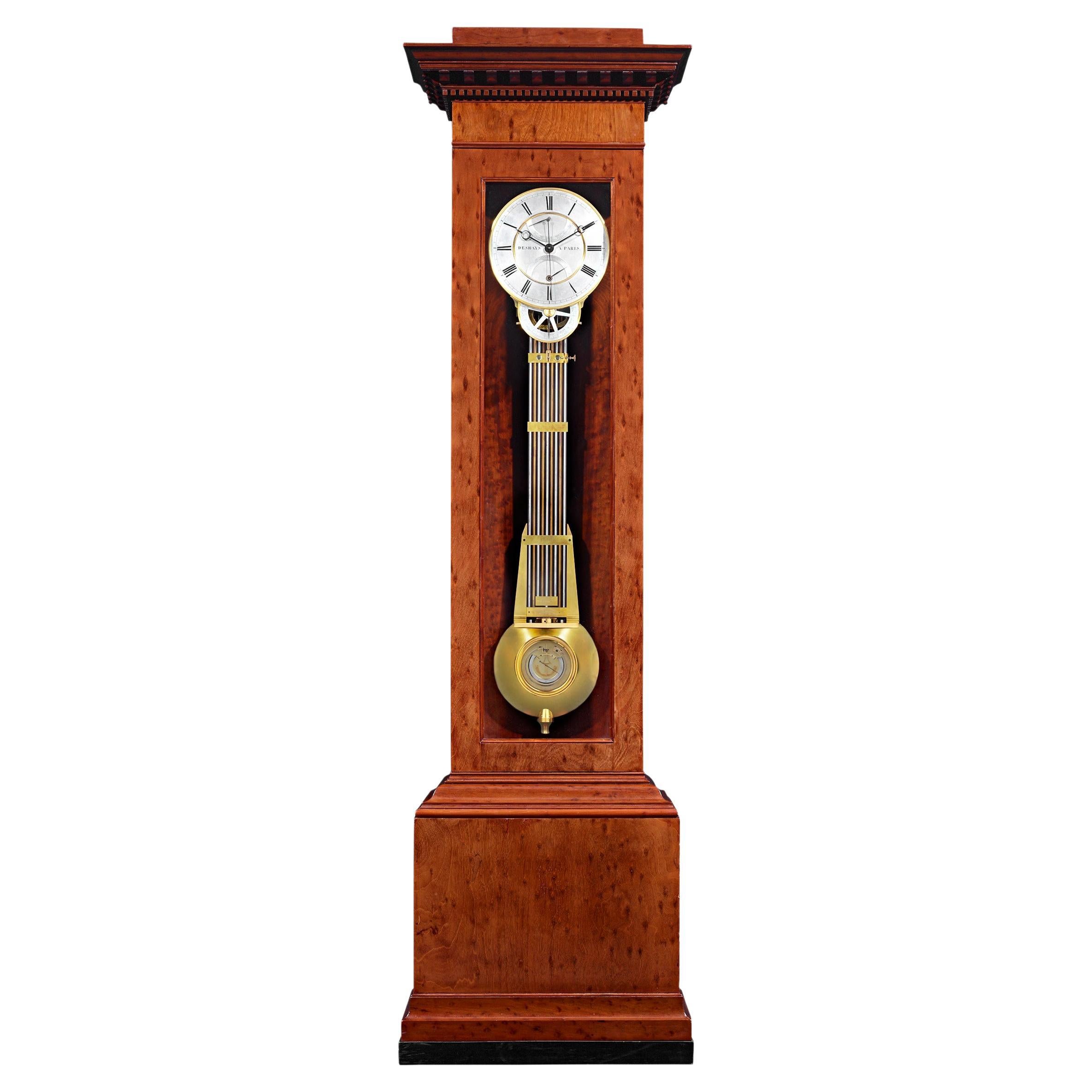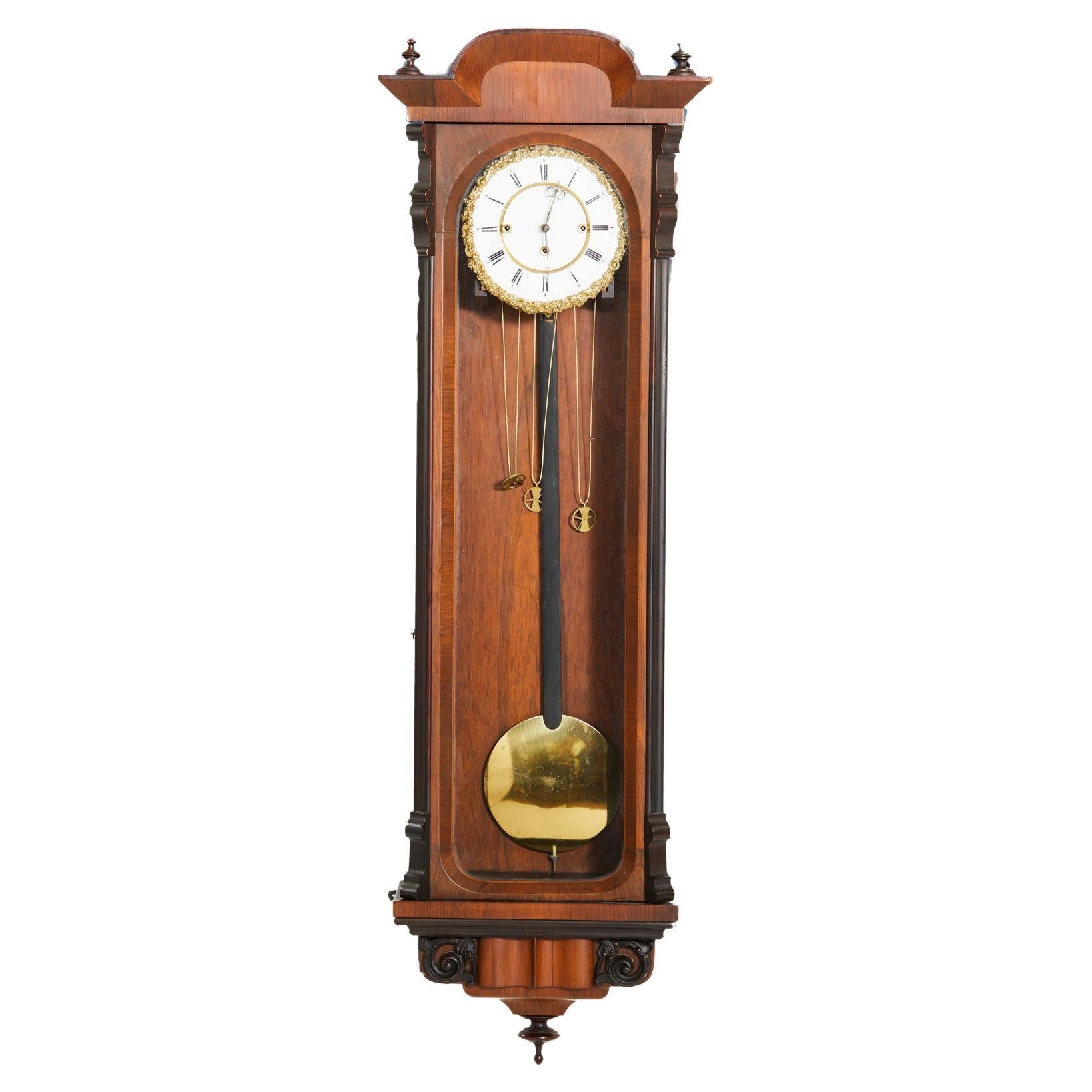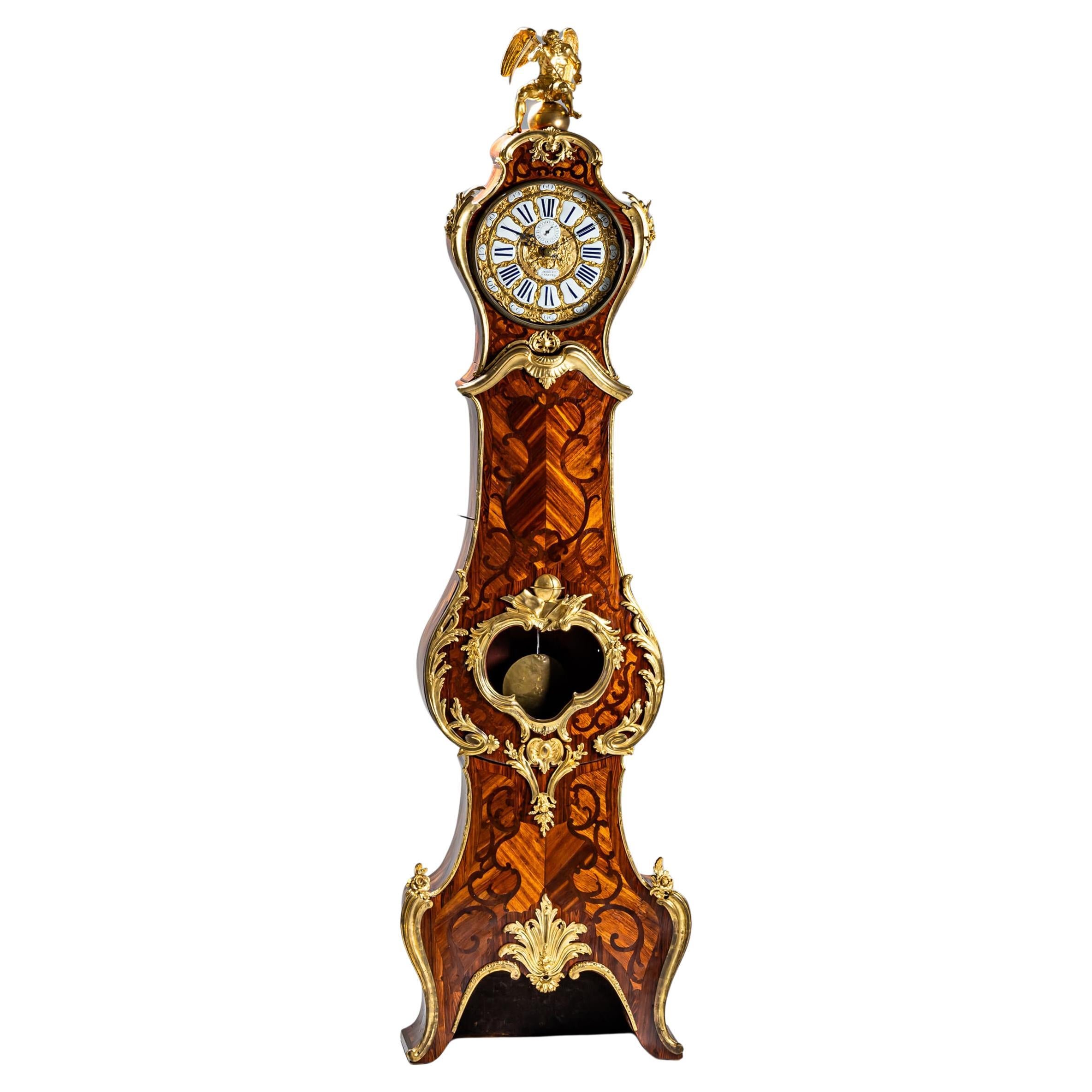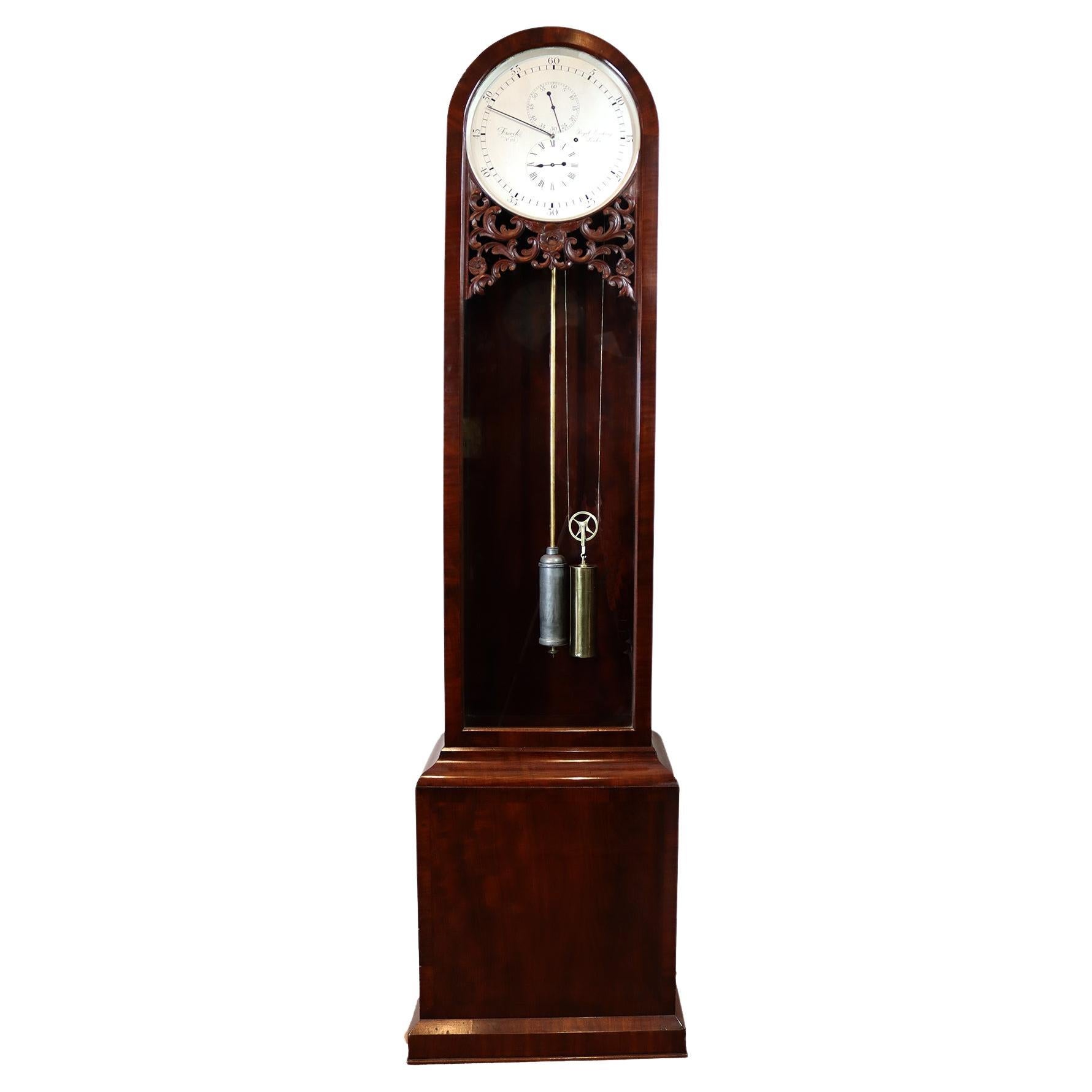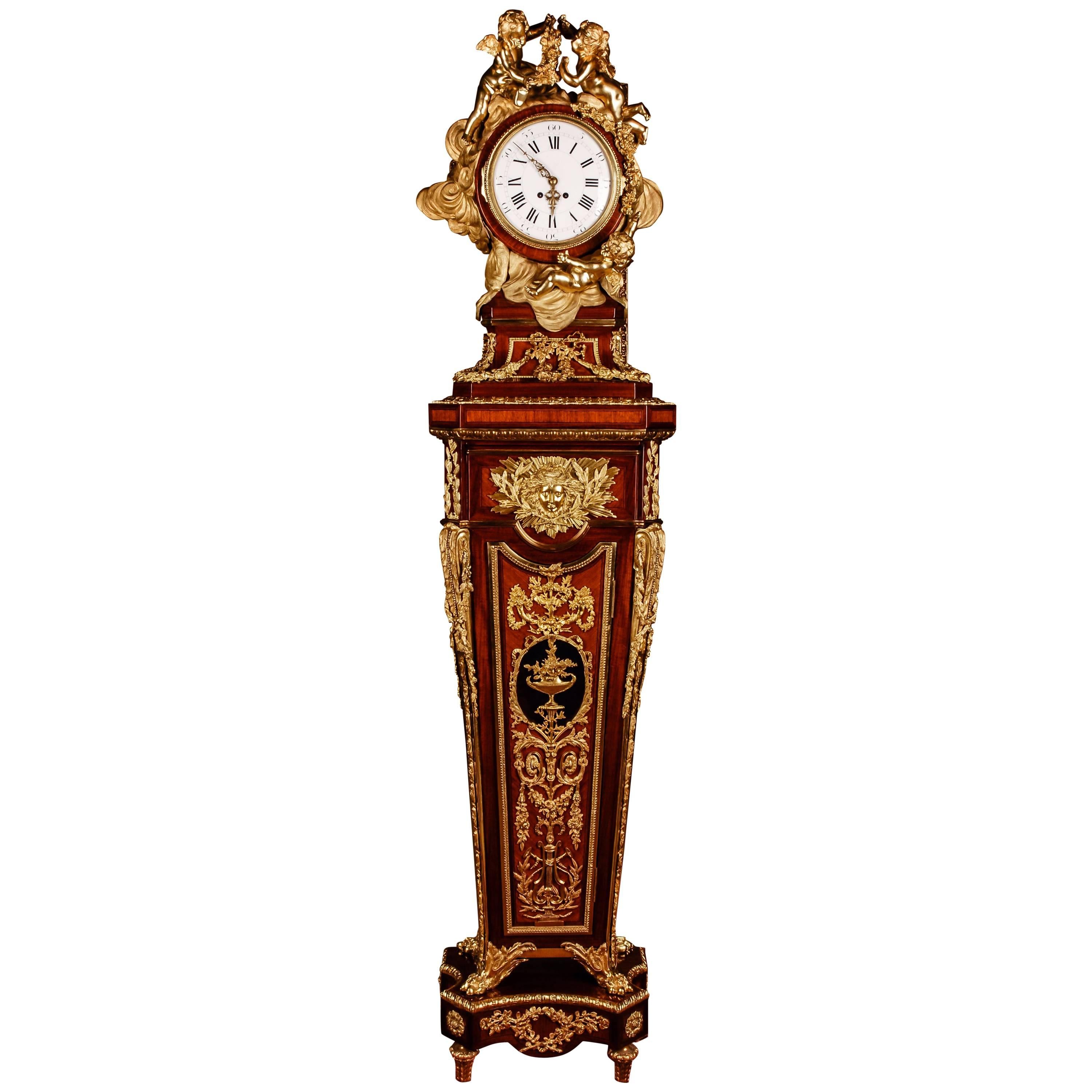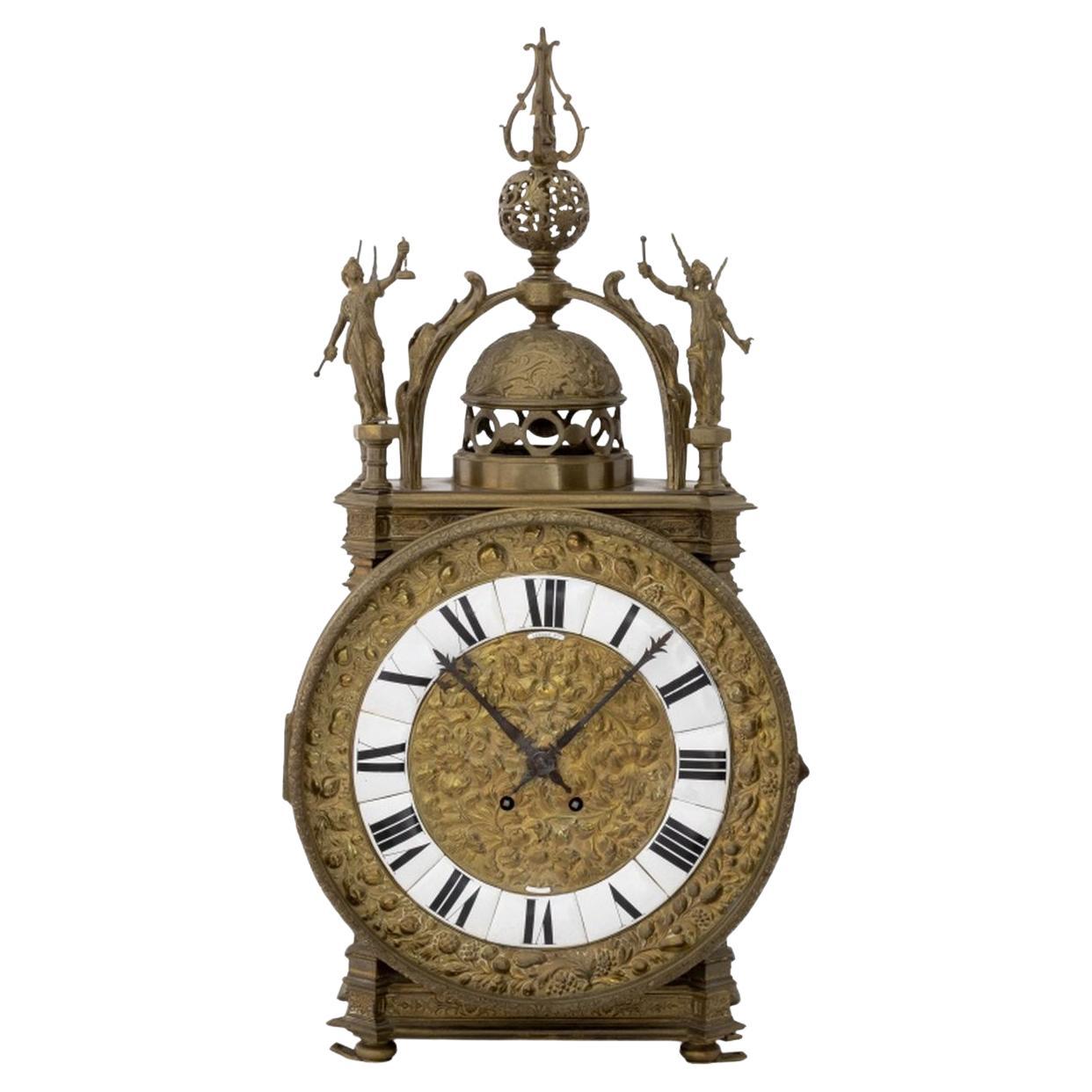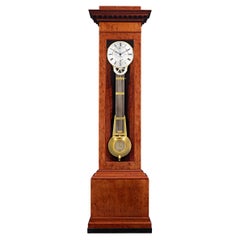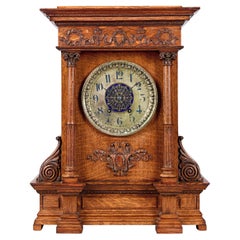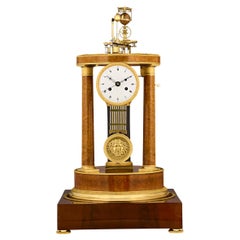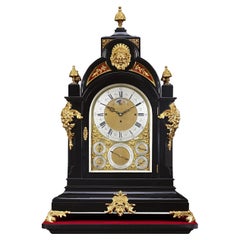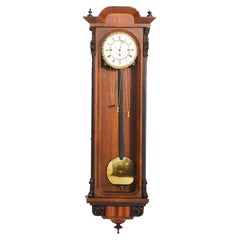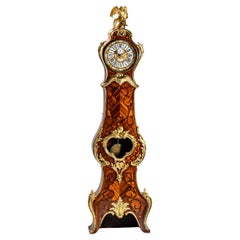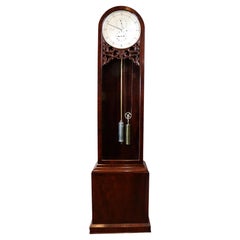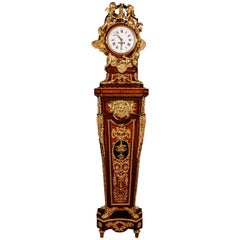Items Similar to Regulator Clock by Jean-Aimé Jacob and Adam Weisweiler
Video Loading
Want more images or videos?
Request additional images or videos from the seller
1 of 8
Regulator Clock by Jean-Aimé Jacob and Adam Weisweiler
$248,500
£192,833.89
€217,722.11
CA$355,580.39
A$388,003
CHF 200,740.38
MX$4,641,682.05
NOK 2,535,831.74
SEK 2,381,106.30
DKK 1,625,997.12
About the Item
This important regulator clock beautifully demonstrates the heights of precision clockmaking. While regulator clocks are known for their incredible accuracy, this timepiece is truly exceptional in its mechanical proficiency. Crafted and signed by Jean-Aimé Jacob, one of the most important French horologists of his age, the clock features a weight-driven movement with a deadbeat, or “Graham” escapement, the most accurate escapement that is still used to this day. Its ingenious construction eliminates the recoil, and therefore the inaccuracy, of the more common anchor escapement.
While most regulator clocks were created purely for function rather than aesthetics, this timepiece is set apart by its equally important case. Crafted of rare plum pudding mahogany, the case is attributed to the atelier of Adam Weisweiler, one of the foremost ébénistes of the Louis XVI period. The German-born cabinetmaker is best remembered for his neoclassical creations that were beloved by the French court, including Queen Marie-Antoinette, the king of Naples and England's Prince Regent (later George IV). Not only did he use the finest of materials, but his craftsmanship also showed a remarkable level of precision and proportion that is perfectly displayed in this clock case. The incorporation of ebony and gilded accents is also typical of his work, and here both materials beautifully complement the rich texture and mottled finish of the plum pudding mahogany.
After his retirement, his son Jean oversaw Weisweiler’s atelier until 1844. This clock case typifies the ebony and gilded neoclassical aesthetics made popular by his father that prevailed during the last decades of the Ancien Régime. Today, Weisweiler’s furniture can be found in all of the most important museums around the world, including the Metropolitan Museum of Art (New York), the J. Paul Getty Museum (Los Angeles), the Royal Collection Trust (London), the Museum of Fine Arts (Boston), the Philadelphia Museum of Art and many others.
Once primarily found in prominent public and government buildings, regulator clocks have been the most accurate of the weight-driven clocks since their inception in the mid-18th century. Because of the expense to create them and their primary duty of being the keepers of time by which other clocks would be calibrated, relatively few regulator clocks were ever made, as evidenced by the small number of antique specimens that exist today. This fact, in conjunction with its incredible mechanism and overall workmanship, makes this regulator a true mechanical marvel.
Circa 1830
22 3/4" wide x 12 5/8" deep x 84 1/2" high
- Dimensions:Height: 84.5 in (214.63 cm)Width: 22.75 in (57.79 cm)Depth: 12.63 in (32.09 cm)
- Style:Louis XIV (In the Style Of)
- Materials and Techniques:
- Place of Origin:
- Period:
- Date of Manufacture:circa 1830
- Condition:
- Seller Location:New Orleans, LA
- Reference Number:Seller: 31-38031stDibs: LU891127104882
About the Seller
5.0
Recognized Seller
These prestigious sellers are industry leaders and represent the highest echelon for item quality and design.
Established in 1912
1stDibs seller since 2010
114 sales on 1stDibs
Typical response time: 8 hours
- ShippingRetrieving quote...Shipping from: New Orleans, LA
- Return Policy
More From This Seller
View AllMonth-Going Regulator Clock by Deshays à Paris
Located in New Orleans, LA
This Louis-Philippe-period month-going longcase regulator clock is an exceptional example of French clockmaking, and its complicated mechanism marks several different aspects of passing time. Crafted by Deshays à Paris, the timepiece displays sleek silvered steel dials that indicate the time, date, month, equation of time...
Category
Antique 19th Century French Louis Philippe Grandfather Clocks and Longca...
Materials
Steel
Vincenti et Cie Mantel Clock for Bailey, Banks & Biddle
Located in New Orleans, LA
Wooden Mantel Clock
Vincenti et Cie
Late 19th century
The mechanism is marked "Vincenti et Cie, Médaille d'Argent 1855, Made in France." Vincenti et Cie, established in 1823 by Jean Vincenti in Montbéliard, was revitalized by Albert Roux in 1829, who expanded and innovated the company. Under Roux's leadership, the firm continued its Montbéliard operations and opened a store in Paris in 1850 on Rue d'Anjou in the Marais. The company earned a silver medal (Médaille d'Argent) at the 1855 Exposition Universelle, for which this clock bears the mark "Médaille d'Argent, 1855," symbolizing its excellent craftsmanship.
The clock dial is marked Bailey, Banks & Biddle for the oldest nationwide jeweler in America, originally founded in 1832 in Philadelphia, Pennsylvania. The company is one of America's most prestigious retailers, known for creating the updated and final version of the Great Seal of the United States as well as the first 40,000 Purple Heart medals...
Category
Antique 19th Century French Mantel Clocks
Materials
Oak
Raingo Orrery Clock
Located in New Orleans, LA
Orrery Clock
Zacharie Raingo
Circa 1817
This exceptional orrery clock represents one of the most historically significant and mechanically sophisticated ...
Category
Antique 19th Century French Table Clocks and Desk Clocks
Materials
Bronze, Enamel
$445,000
Monumental Three-Train Bracket Clock by J.C. Jennens & Sons
Located in New Orleans, LA
This intricately detailed 19th-century bracket clock from famed English firm J.C. Jennens & Sons is monumental in size, likely made for one of the great world exhibitions or perhaps to put in the firm's own store window. The eight-day timepiece has a triple fusee...
Category
Antique 19th Century English Table Clocks and Desk Clocks
Materials
Bronze
George III Adam and Eve Automaton Longcase Clock
By James Fenton
Located in New Orleans, LA
A majestic specimen of English clockmaking, this important longcase clock by London clockmaker James Fenton features an exceptional Adam and Eve automaton above the dial. Longcase ti...
Category
Antique 18th Century English George III Grandfather Clocks and Longcase ...
Materials
Mahogany
The Linke Grand Regulator World's Fair Clock
By François Linke
Located in New Orleans, LA
Grand Regulator World's Fair Clock
François Linke
Circa 1900
Widely regarded as the greatest sculptural clock ever created, this monumental régulateur by François Linke was conceived as a statement for the 1900 Paris Universal Exposition, a moment when the world’s finest artisans competed on an international stage. Linke, the most celebrated ébéniste of the Belle Époque, was awarded the prestigious gold medal for his display, which critics described as “the biggest event in the history of furnishing art in the year 1900.” Designed in collaboration with the sculptor Léon Messagé, the clock exemplifies Linke’s ambition to elevate furniture and timepieces to the realm of fine art.
The clock represents over a decade of design and craftsmanship. Only six examples of this model were ever completed due to the extraordinary labor and cost involved. Building just one had a production cost of 22,966 francs, the equivalent of approximately eight years' wages for the average French worker in 1900. The clock is illustrated on the spine of Christopher Payne’s definitive monograph on Linke. Mahdi Al-Tajir, one of the world’s most important collectors, later acquired the present model. Another is located at Whitehall, the Flagler Museum in Palm Beach. It was acquired by Rockefeller’s partner, Henry Flagler...
Category
20th Century French Art Nouveau Grandfather Clocks and Longcase Clocks
Materials
Marble, Ormolu
You May Also Like
19th Century Grande Sonnerie Vienna Regulator Clock
Located in Tarry Town, NY
Mid 19th century Mahogany wood / glass case grande Sonnerie three weight Vienna Regulator clock. The wall clock features a rosewood veneer with ...
Category
Antique 1830s European Wall Clocks
Materials
Brass
Louis XV Longcase Clock, France, Mid-18th Century
Located in Greding, DE
Grand French longcase clock in Louis XV style featuring a mahogany case adorned with finely cast and fire-gilt bronze mounts. The clock is surmounted by a fully sculpted figure of Ch...
Category
Antique Mid-18th Century French Louis XV Grandfather Clocks and Longcase...
Materials
Bronze, Enamel
On Hold
$56,913
Regulator by French Royal Exchange
By French Royal Exchange London
Located in Amersham, GB
A very fine regulator made by the firm of French Royal Exchange, the eight day movement with Harrison’s maintaining power and deadbeat escapement...
Category
Antique 1850s English Victorian Grandfather Clocks and Longcase Clocks
Materials
Brass
20th Century Louis XVI Style Museum Pedestal Clock after Jean-Henri Riesener
By Jean-Henri Riesener
Located in Berlin, DE
A Model of Jean Henri Riesener (Received Master in 1768) executed in 1785. (Inv. OA 5501 in Louvre Museum). 19th century. This fine and sumptuous “Regulateur de Pendule” presents a fine amaranth. Of Sycamore oeuil de vermeuil, ebony and buis stringing marquetry. The base and the gaine are decorated with diamond shapes. The hours are inscribed in Roman numerals and the munutes in Arabic. It takes place in a magnificent gilt décor of three winged children playing with garlands on clouds. The regulator is enriched with a delicate garniture of bronze. The dial and each panel are framed by an elegant frieze of palms and pearls. The top of the gaine is enhanced with a frieze of palms and ovums, foliages and garlands of flowers. Each corner is ornated with fleurons. The front of the gaine is embellished by an Apollo mask (Sun Symbol) and each side with laurel crowns. Under the mask the cartouche is decorated by a stylized vase of flowers.
Folliated scrolls, flowers, garlands, cornucopias and musical instruments such as a harp (Apollo Reference) The cherubs are underlined by pearls, scrolls of Acanthus Leaves and garlands dawning out in foliages, framed with ropes until the lions feet. The feet rest on a base ornated with fleurons and foliages with buds of flowers ending in four conical feet with acanthus leaves.
With André-Charles Boulle (1642-1732) and Charles Cressent (1685-1768), Riesener was arguably one of the three greatest French ébénistes of the 18th century. Eventually taking over the workshop after Oeben’s death in 1763, and marrying his widow some four years later. He is renowned for completing the famous bureau du Roi...
Category
20th Century Louis XVI Grandfather Clocks and Longcase Clocks
Materials
Bronze
LeRolle Regence Style Brass Pedestal Clock
Located in Astoria, NY
Regence Style Brass Pedestal Clock, by LaRolle Fres, Paris, 19th century, the repousse dial with enamel chapter ring, signed "LaRolle Fres, Paris", movement strikes on gong, surmount...
Category
Antique 19th Century Louis XIV Mantel Clocks
Materials
Brass, Enamel
Superb 19th Century Grandfather Clock by Haentges Freres
By Haentges Freres
Located in Tarzana, CA
A superb quality 19th century French Louis XV Style Ormolu Mounted Mahogany and King-wood Parquetry "Re´gulateur de Parquet" Grandfather longcase Clock by Haentges Freres.
The drum...
Category
Antique Late 19th Century French Louis XVI Grandfather Clocks and Longca...
Materials
Ormolu
$88,500 Sale Price
25% Off
More Ways To Browse
Weight Clock
Prince Regent
Antique Time Clock
Antique Regulator
Antique French Grandfather Clock
Antique French Longcase Clocks
Adam Weisweiler
19th Century French Grandfather Clock
19th Century French Longcase Clock
Paul Getty
Regulator Clock
Regulator A
Royal Collection Trust
Antique Regulator Clocks
French Mahogany Clock
Antique 8 Day Grandfather Clock Grandfather Clocks
French Regulator Clock
Longcase Regulator
